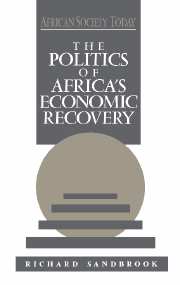3 - Creating and enabling liberal states
Published online by Cambridge University Press: 09 November 2009
Summary
Today a liberal-democratic ethos infuses the thinking on the appropriate political reforms to support Africa's economic recovery. The large aid donors, the multilateral financial agencies, and, reluctantly or not, African governments now subscribe to the new consensus. A minimal liberal state, enabled by capacity-building initiatives and disciplined by a democratic politics, is efficiently and effectively to maintain the legal, administrative, political, and infrastructural conditions for private capital accumulation. Such a rejuvenated and reformed state will not only safeguard human rights, but also (it is believed) advance the developmental objective articulated on all sides – an environmentally sustainable and equitable pattern of growth. This is a bold, though problematical, vision.
The abiding faith in a minimal state is the first problematical aspect. This faith rests on a widespread disillusion with central governments in the 1980s. The public sector in industrialized democracies, communist countries, and the Third World alike had become a major, and often inefficient, consumer of resources. Many governments ran high budget deficits that appeared to contribute little to growth or welfare, while feeding inflationary pressures. In Africa in particular, scholars and outspoken citizens denounced governments for their rapacity, capriciousness, and wastefulness. Yet this anti-state reaction ignored a salient truth. The experience of industrializing countries suggests that underdeveloped countries will not achieve rapid development in the modern, highly competitive world without extensive governmental economic action. Hence, a policy aimed at severely reducing the economic role of African states, though it may be defensible in the short run, is not optimal in the longer term.
- Type
- Chapter
- Information
- The Politics of Africa's Economic Recovery , pp. 56 - 86Publisher: Cambridge University PressPrint publication year: 1993



